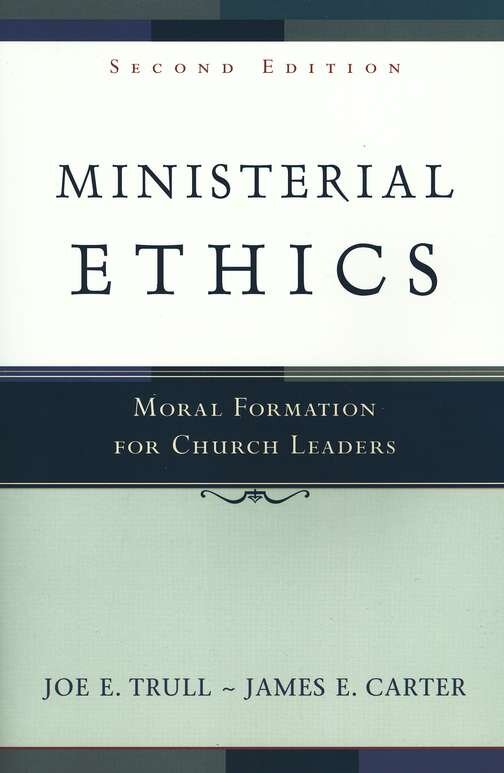Joe E. Trull and James E. Carter, Ministerial Ethics: Moral Formation for Church Leaders. Second Edition. Baker Academic, 2004.
Referenced in: Ministry Ethics
LifeandLeadership.com Summary
This is the standard text on ministerial ethics, now in its second edition since the first in 1993. The purpose of the book is twofold:
1) to teach Christian ministry students the unique moral role of the minister and the ethical responsibilities of that vocation; 2) to provide new and established ministers with a clear statement of their ethical obligations in personal and professional life. (11)
This is the kind of text that addresses questions such as:
“What ethical standards are required of a minister? What does confidentiality mean, and is it always expected? How is pastoral authority abused? When is preaching plagiarized? Is there a code of ethics that all ministers should follow?” (17)
The authors offer six foundational statements about ethics in ministry:
1. Most ministers want to be persons of integrity, persons whose professional lives uphold the highest ethical ideals. One goal of the book is to assist ministers in fulfilling the command of Christ to “be perfect as your Father is perfect” (Matt. 5:48), attaining an increasing level of moral maturity in both their personal and professional lives.
2. Developing moral character and ethical conduct is a difficult process. While all major books on ministry ethics echo the common theme of the necessity of trustworthiness, prudence, truthfulness, and integrity. Developing these traits requires daily discipline.
3. Every minister needs training in ethics and spiritual formation. This should be a part of a minister’s vocational training.
4. There is an art to doing ethics, one that can also be learned. Before entering the gospel ministry, every ordained church leader must be examined by a responsible group to determine moral and spiritual fitness.
5. The central moral choice facing the Christian minister is the same one facing all professionals: Will I be an enabler or an exploiter? It is the nature of a professional to render services that pose serious possibilities: life or death (doctor), poverty or wealth (lawyer), and salvation or damnation (minister). The client/parishioner is in a dependent position and is vulnerable to exploitation by the professional who holds “dangerous knowledge,” knowledge that can be used for benefit or exploitation. Ministers…must be sure that the service they render is given to enable, not to exploit financially, sexually, or in any other way.
6. A ministerial code of ethics, if used appropriately, is beneficial to ministers and to the communities they serve.
Operating from this perspective, Trull and Carter discuss ethics from the standpoint of the minister’s personal lifestyle, financial decisions, family commitments, pastoral responsibilities, congregational relationships, community involvement, and much more.
Summary of the Table of Contents:
- The Minister’s Vocation: Career or Profession?
- The Minister’s Moral Choices: Endowed or Acquired?
- The Minister’s Personal Life: Incidental or Intentional?
- The Minister’s Congregation: Friend of Foe?
- The Minister’s Community: Threat or Opportunity?
- A Major Ethical Issue: Clergy Sexual Abuse
- A Ministerial Code of Ethics: Help or Hindrance?
Five appendices cover procedures for responding to charges of clergy sexual abuse and ministerial codes of ethics from various denominations past and present.
From the Publisher
Ministerial Ethics provides both new and experienced pastors with tools for sharpening their personal and professional decision-making skills. The authors seek to explain the unique moral role of the minister and the ethical responsibilities of the vocation and to provide “a clear statement of the ethical obligations contemporary clergy should assume in their personal and professional lives.” Trull and Carter deal with such areas as family life, confidentiality, truth-telling, political involvement, working with committees, and relating to other church staff members. First published in 1993, this edition has been thoroughly updated throughout and contains expanded sections on theological foundations, the role of character, confidentiality, and the timely topic of clergy sexual abuse. Appendices describing various denominational ministerial codes of ethics are included.
About the Authors
Joe E. Trull (Th.D., Southwestern Baptist Theological Seminary) is editor of Christian Ethics Today and formerly served as professor of Christian ethics at New Orleans Baptist Theological Seminary.
James E. Carter (Ph.D., Southwestern Baptist Theological Seminary), a veteran pastor with over thirty years of experience, is the former director of the Division of Church-Minister Relations in the Louisiana Baptist Convention.
***For additional information on this resource, including reviews, click the bookstore links. Check the reference at page top or the links below for resource guides on related topics.***
See Resources on Over 100 Ministry Topics:


